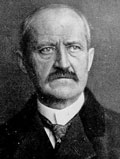Georg Michaelis studied law in Breslau, Leipzig and Wurzburg, and graduated from the Göttingen University in 1884. On invitation of the Japanese government, he taught at the German school of law in Tokyo (1885-1889). Upon his return to Germany he became a Prussian civil servant and quickly rose in the administrative hierarchy. In 1909 Michaelis became undersecretary of state in the Finance Ministry. During World War I he chaired the department for grain supply (from 1915), and in early 1917 was appointed Prussian state commissioner for food procurement. When the German supreme military command insisted on resignation of Theobald von Bethmann Hollweg, Michaelis was chosen as the next Reich Chancellor and the president of the Prussian state ministry. His caretaker government fully relied on the support of Generals Erich Ludendorff and Paul von Hindenburg and acted in their interests. By making uncertain statements, Michaelis practically refused to accept the demands for peace made by the Reichstag (July 1917) and Pope Benedict XV (August 1917). As Prussian premier, he declined the proposal to reform the electoral system. His accusations against the Independent Social Democratic Party (USPD), who, in his opinion, helped the naval mutiny brought about his resignation. Michaelis made an attempt to retain the post of Prussian premier, but his plan failed. Before the November revolution Michaelis became president of local government of Pomerania (1 Apr 1918 - 31 Mar 1919) and later was involved in Protestant church organizations and projects for student welfare. In 1919 he joined the German National People's Party (DNVP). |

